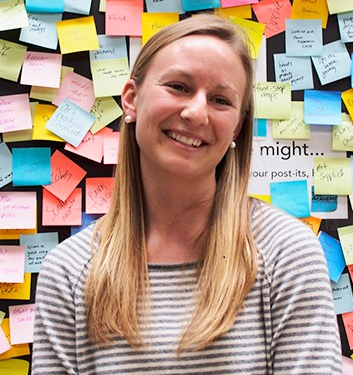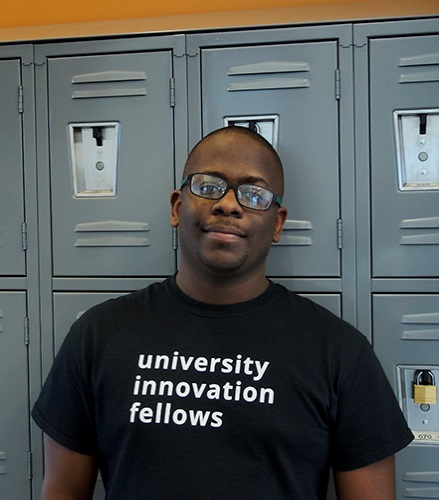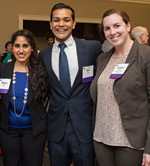
In this year’s proclamation of November as National Entrepreneurship Month, President Obama stated:
Across our Nation, in laboratories and around kitchen tables, passionate and creative entrepreneurs are developing new sources of clean energy, cures for life-threatening diseases, and inventions that will transform the way we see the world. America has always been a country of risk takers and dreamers – where anyone who is willing to work hard can turn a good idea into a thriving business – and our spirit of ingenuity remains a powerful engine of growth, creating jobs and bolstering our economy. This month, we recognize the grit and determination of American inventors and innovators and their many contributions to our Nation, and we reaffirm our commitment to support these entrepreneurs as they develop the products, services, and ideas of tomorrow.
At a recent town hall meeting, the President spoke about his excitement over how more and more young people are seizing unprecedented opportunities to start and scale new companies, and emphasized that “entrepreneurship is in the DNA of this generation.” This passion is evident among the University Innovation Fellows, students who are on a mission to generate more entrepreneurial activity and collaboration across their campuses.
Supported by Epicenter, a national hub for entrepreneurship and engineering education funded by the National Science Foundation, this program has more than tripled in the past year to 168 students at 85 campuses.
During last year’s National Entrepreneurship Month, we highlighted the Fellows’ newly launched University Innovation platform for student leaders to share organizing tools and promising programs. A year later, we caught up with several of these University Innovation Fellows to see what they’ve accomplished as change agents and to hear their visions for the future:
Bre Przestrzelski, Clemson University
 “As a University Innovation Fellow and PhD student in the Clemson University BioEngineering Program, I identified a gap in student exposure to entrepreneurship and innovation. To help address this challenge, I founded The DEN (Design & Entrepreneurship Network) to bring together students from all majors to transform ideas into companies. The DEN is a student-led “open mic” platform on which students can share ideas for a business product or concept, form interdisciplinary business teams, and receive instant feedback and mentorship from real entrepreneurs, designers, CEOs and founders. There are several physical DEN spaces around campus where students come together to work through ideas on whiteboard walls, prototype concepts with low-resolution materials, and present their business ideas for real-time feedback. Hopefully, we can provide students with the application-based learning they need in The DEN to help make them, their companies, and Clemson University as a whole more successful.”
“As a University Innovation Fellow and PhD student in the Clemson University BioEngineering Program, I identified a gap in student exposure to entrepreneurship and innovation. To help address this challenge, I founded The DEN (Design & Entrepreneurship Network) to bring together students from all majors to transform ideas into companies. The DEN is a student-led “open mic” platform on which students can share ideas for a business product or concept, form interdisciplinary business teams, and receive instant feedback and mentorship from real entrepreneurs, designers, CEOs and founders. There are several physical DEN spaces around campus where students come together to work through ideas on whiteboard walls, prototype concepts with low-resolution materials, and present their business ideas for real-time feedback. Hopefully, we can provide students with the application-based learning they need in The DEN to help make them, their companies, and Clemson University as a whole more successful.”
Greg Wilson, University of Georgia
 “This past year, my goal has been to increase the entrepreneurship and innovation culture on campus by breaking down silos and bringing students from all backgrounds together. My most successful venture thus far has been the development of a design challenge event. “Thinc-a-thon,” inspired by famous design firm IDEO, brings together students from all disciplines (including engineering, computer science, art, design, and business) for the purpose of creating a new project or business. Our next event, “Design + Food,” will be the first to make use of the Science Library makerspace that I helped develop with the Vice President for Research and the Director of University Libraries. I also assisted in developing a Student Council for Economic Engagement to raise awareness to entrepreneurship initiatives on campus.”
“This past year, my goal has been to increase the entrepreneurship and innovation culture on campus by breaking down silos and bringing students from all backgrounds together. My most successful venture thus far has been the development of a design challenge event. “Thinc-a-thon,” inspired by famous design firm IDEO, brings together students from all disciplines (including engineering, computer science, art, design, and business) for the purpose of creating a new project or business. Our next event, “Design + Food,” will be the first to make use of the Science Library makerspace that I helped develop with the Vice President for Research and the Director of University Libraries. I also assisted in developing a Student Council for Economic Engagement to raise awareness to entrepreneurship initiatives on campus.”
Lauren Abston and Ryan Phillips, University of Oklahoma


"Over the past year as University Innovation Fellows, we found that our campus had a surplus of activities going on, and what we needed was a centralized group to combine the efforts of the many colleges and organizations that had previously been working on independently. By working together with the College of Engineering, College of Business, Libraries, College of Architecture, and many other groups, we have been approved to create a 25,000-square-foot innovation hub. In addition to being open to students, the space will be open to community members and K-12 students. By creating the most advanced maker space in the state of Oklahoma, we can allow students and community members to achieve their dreams and create the next billion dollar business without leaving the state.”
Meenu Singh, Atin Mittra, and Valerie Sherry, University of Maryland
 “The three of us have been resolutely determined to shift the focus of innovation and entrepreneurship resources from traditional channels such as business and engineering to all colleges and majors at the University of Maryland, College Park. Through our sponsor organization, the Academy for Innovation and Entrepreneurship, we have been empowered to combine methodologies such as Design Thinking and Lean Launchpad into a wide variety of classes from Countering Violent Extremism to English. We view innovation and entrepreneurship not as an action or lifestyle but a mindset, one which is desperately needed in today’s world and something we seek to instill in all types of students.”
“The three of us have been resolutely determined to shift the focus of innovation and entrepreneurship resources from traditional channels such as business and engineering to all colleges and majors at the University of Maryland, College Park. Through our sponsor organization, the Academy for Innovation and Entrepreneurship, we have been empowered to combine methodologies such as Design Thinking and Lean Launchpad into a wide variety of classes from Countering Violent Extremism to English. We view innovation and entrepreneurship not as an action or lifestyle but a mindset, one which is desperately needed in today’s world and something we seek to instill in all types of students.”
 "As a University Innovation Fellow, it has been a privilege to be involved in discourse regarding the reshaping of engineering education. Earlier this year I was asked to attend the National Academy of Engineering workshop on the Grand Challenge Scholars program, where 80 deans from engineering institutes around the country discussed how we might produce well rounded engineering students. As a result, I am currently working on co-creating an engineering study abroad program geared towards exposing Arizona State University undergraduate engineering students to emerging economies in developing countries. As we live in an increasingly globalized world, the importance of a global engineering education cannot be overstated. Sending ASU undergraduate engineering students to learn in the developing world will expose them to incredible challenges and encourage personal growth in ways traditional engineering curriculum could never emulate. Creating international partnerships and encouraging design thinking in estrangement to the traditional classroom will change the world."
"As a University Innovation Fellow, it has been a privilege to be involved in discourse regarding the reshaping of engineering education. Earlier this year I was asked to attend the National Academy of Engineering workshop on the Grand Challenge Scholars program, where 80 deans from engineering institutes around the country discussed how we might produce well rounded engineering students. As a result, I am currently working on co-creating an engineering study abroad program geared towards exposing Arizona State University undergraduate engineering students to emerging economies in developing countries. As we live in an increasingly globalized world, the importance of a global engineering education cannot be overstated. Sending ASU undergraduate engineering students to learn in the developing world will expose them to incredible challenges and encourage personal growth in ways traditional engineering curriculum could never emulate. Creating international partnerships and encouraging design thinking in estrangement to the traditional classroom will change the world."
Ben Riddle, Furman University
 “At Furman University, I partner with students, faculty, administrators and alumni to create new initiatives that use design thinking as a tool for engaged learning. Over the past two years, I've curated a TEDx event called Redesigning Education, and partnered with students and community members to develop a community incubator called The Makery. In partnership with TheThirdTeacher+ and the Associated Colleges of the South, I brought together multiple faculty to develop a new course called Design for Social Change, which introduces design thinking as a tool for community problem solving. I am currently working with the Institute of Child Success to explore ways that human centered design can be used to improve the health and well-being of children and families in the early childhood system. I am also working with urban designers and service providers to develop Victory Village, a new model for homeless service provision that combines housing and services with pathways to education, entrepreneurship and vocational agriculture in a mixed-income community.”
“At Furman University, I partner with students, faculty, administrators and alumni to create new initiatives that use design thinking as a tool for engaged learning. Over the past two years, I've curated a TEDx event called Redesigning Education, and partnered with students and community members to develop a community incubator called The Makery. In partnership with TheThirdTeacher+ and the Associated Colleges of the South, I brought together multiple faculty to develop a new course called Design for Social Change, which introduces design thinking as a tool for community problem solving. I am currently working with the Institute of Child Success to explore ways that human centered design can be used to improve the health and well-being of children and families in the early childhood system. I am also working with urban designers and service providers to develop Victory Village, a new model for homeless service provision that combines housing and services with pathways to education, entrepreneurship and vocational agriculture in a mixed-income community.”
Doug Rand is Assistant Director for Entrepreneurship at OSTP.

